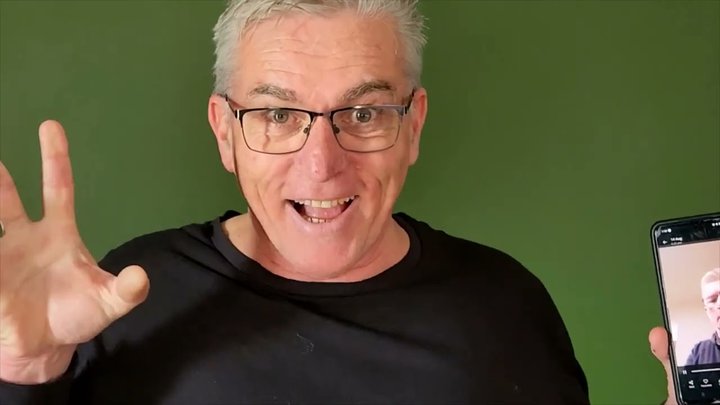12 September 2023
Fergus Aitken has been a performer for over 40 years, working across stand-up, mime, corporate entertainment, children's theatre and as a teacher of physical theatre. One of his most beloved characters, Mr Fungus, famous for being New Zealand's loudest mime, is back this school holidays with a new show, Mr Fungus Dreams.
I stopped by Circa and caught up with Fergus during the last few weeks of putting the show together to find out just what Mr Fungus Dreams is all about, how Fergus and his team have put the show together and the joys (and perils) of performing for children.

What can audiences expect from your new show, Mr Fungus Dreams?
It’s an adventure story. It’s a story of self-discovery. Basically it’s based around the idea that we all have what we need even when we don’t think so, when we don’t necessarily realise it. It’s about resilience and it’s actually a journey of self.
It’s also really kid-friendly. I mean, there are pirates! And puppets.
It’s a very physical, visual kind of style of theatre. There are one or two visual illusions, there’s a bit of mime. It’s very light and whimsical to begin with. I don’t like to use the C-word, but there is clowning. I just never use that word in my marketing because of the way New Zealand audiences misunderstand what clowning actually is.
We have two directors. One of them is my wonderful wife Amalia and also Thom Monckton who is undoubtably one of New Zealand’s great clowns. Thom and I talk about the fact that using the word clown can be the kiss of death in terms of conveying to an audience what a show is. It’s visual theatre – that’s a lot more accessible and also true to what it is. It’s not all clown. It’s definitely absurd - absurd theatre that has some visual elements to it.
What people can expect is comedy that works on different levels, with something in it for different ages – I always say it’s for kids of all ages – and that’s not because we’re trying to get a broad audience. It’s because we make work that we think appeals to a wide range of people.
You might not know this, but I have a two-year-old and she was at rehearsal earlier today and she was laughing, she was engaging with it.
My first director, Robert Bennett at Mime International used to say that kids under four don’t understand mime, especially physical illusory mime. They don’t necessarily get that what you’re miming represents another actual action. I think that’s a pretty generalised statement – I’m not saying he’s wrong – but I don’t think you can put an age on it. Sometimes you think something is for the really young ones, but it’s actually the grumpy 12-year-old who likes it, or an 83-year old.
We’re having so much fun devising it. I have such an amazing team. Amalia Calder, my wife, who is one of the directors, and the producer, and, well, everything. And Mike Ainsworth, my production manager and also stagehand who is actually a really important part of the show. It’s the first time I’ve collaborated with Marcus McShane, the lighting designer and he’s really incredible – he has such a great sense of style and he knows so many facets of theatre, so that’s been fun. Like so many pieces of devised theatre, there’s been a lot of playing around to find what works, what’s actually going to fit the story. We spent a whole day trying to create a rainbow using water vapour – it didn’t work, but it was a fun day.
What are the best and worst things about performing for children?
Without a doubt the best thing – well, actually there are two things – their imaginations are vast, kids aren’t likely to turn around and point out the plot holes. They just go with it. I think many kids can handle abstract far better than adults. Adults are far more analytical and are looking for structural defects where kids just see the images and get the feelings and go wow!
And kids are direct and honest. As a performer, honesty is such a huge part of it. You get a direct response. Little kids aren’t sitting there writing a bad review in their head. Adults will sit there and spend the whole show thinking up some scathing thing they’re going to say to their friends to tell them not to go to the show. Kids will just lose interest or yell out, “I’m bored, Mum.”
I think it’s an opportunity to engage people on that level and that directness is something that’s kind of an epiphany for actors who’ve never worked with kids before. I’ve known a few actors who’ve had their first experience working with kids and who have been blown away by it. We often start our shows with the actors walking through the audience, in character, and there was this one guy, a real hotshot actor, and he said it was the first time he’d ever had to improvise. This guy found it so freeing, so joyous, to just inhabit the character and make stuff up. To connect with people in a spontaneous way.
Spontaneity and direct honesty work really well with kids because they are so spontaneous as an audience. They give an edge to it. You just know when it’s not working. And they can throw things into the mix that give you a chance to really exist in that moment and inhabit it, going, “that’s never happened before... what do I do?”
Resilience and reliance are the core themes of this piece. How do you balance these serious topics with the comedy and keeping the kids engaged?
We’re not jamming it down their throats. It’s just an undercurrent. The character, Mr Fungus, goes on an adventure and discovers for himself he has everything he needs. In this case he’s an everyman and this is what we all have. Hopefully by relating to his experience, we can realise we’re all actually okay and we can all have fun and it’s okay to be vulnerable and to have trust in the universe.
Without wanting to sound esoteric, there is actually a moment of self-realisation where he realises he can take control of his life and find his own direction, find his way home. We can’t decide for our kids who they are and what their journey is but we can hope they understand that they have all that they need.
What was the creative process like to create this piece?
It started earlier in the year – April or May – when I pitched this idea. It was pretty open then, just the title, really, Mr Fungus Dreams. Then we got offered the season and we started thinking about all the ways it could come together as an adventure story for kids. And at that point, it could go anywhere and if you had all the time and all the money and all the resources in the world, you could spend all your time working on it, but life gets in the way. So you might be thinking about it a lot, but you’re not physically working on it all the time.
There have been threads and directions I’ve followed for a while, then just dropped because they really weren’t working. I’ve had periods of wondering how to proceede. Lots of things I’ve tried out have been left behind. It’s a lot like creating a really wide palette and then choosing the colours that work. There’s a lot of experimentation.
The first time Thom and I got together, we spent four days just talking and throwing ideas around and really just figuring out if we could work together and how that might look. It was very open. But a lot of things we tried then, for various logistical reasons, we haven’t pursued. For so many reasons. Like the price of helium to the physical time we could spend together.
Having spent most of my career alone, as a solo character or a solo performer, to take on a collaborative project where you need those people’s input is hugely revealing and humbling and wonderful. You have to trust the people on your team and let them do their job. People like to feel like their own vision and investment and agency in a project is valued and it’s a big part of keeping them engaged.
Is there any audience participation in this show?
A very small amount. But I’m not going to get you up on stage or ask you to dance.
If you’re doing something that relies on audience participation it is always a risk. If you pick the wrong person... That can lead to some interesting situations. Actually, that’s not the right way to put it. It shouldn’t be on the person. It’s like anything – you got yourself there, now you cope. I’ve seen stand-up comedians ask the audience for suggestions and then be completely unable to cope with whatever has been called out. It’s like, you asked for it, you should play with it.
I had a friend who was an improviser and he asked the audience to throw him something, anything. And I had another friend in the audience and he had a fake leg, so the leg got thrown onto the stage. All he had to do was accept it and laugh with the audience, but he got all flustered and started blaming the guy. But he set it up!
If we as performers ask for something, we should be prepared for whatever we get. You should be up for the challenge. Especially with kids. You can engage with them without asking them to be involved. You just need to be aware of them and play to them and be aware of their concentration levels. Plenty of great theatre for children doesn’t involve them leaving their seats.
Is there anything else you’d like to tell us about the show?
Just that this is a really wonderful moment for me in my career. I feel really privileged to work with all these wonderful people. It’s been challenging, pulling it all together, especially with a young family. But I’ve loved it. I read this great quote the other day, that all you need to succeed is a great idea and not enough time. There’s something about time pressure that makes creatives really get on with it and make decisions. I think that’s important. If you have too much time, you just waffle along and think “we’ll deal with that later”. Time pressure forces you to decide.
It’s been a lot of fun, being here. It’s a great place to play.
Mr Fungus Dreams is at Circa Theatre from 20 September - 7 October. You can book tickets here.


